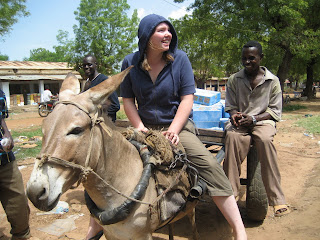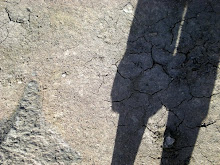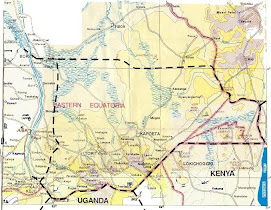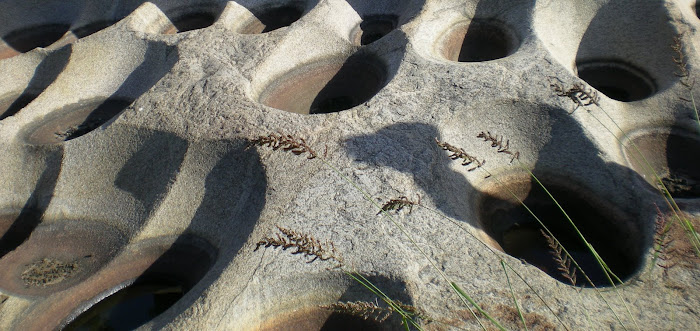If I was ever stupid enough to consider myself to be roughing it in
Torit, the trip to
Lafon put me squarely in my place.
Lafon, a town about three hours away from
Torit (by car, on roads that
don't really count as roads) is one of the most remote areas in Eastern
Equatoria-trumped only by villages like
Kuron and
Nanyangachor up by the Ethiopian border. George and I went up there with Rex, the director of
SSRRC (and my new best friend) and Father Andrew.
The way up was crowded-I was in the front with Rex’s wife (in a normal seat for one) and the driver, and about seven people and a bunch of bags were in the back. We started down this dirt road that was really just a series of muddy ditches lying ahead in a quasi-straight line. That was the road. And
PS. We drove out in style. Three trucks filled with helmeted,
camouflaged, gun toting UN troops accompanied us. They had to go 30
km's an hour, and got stuck about three times, so it took them the whole day to get to
Lafon. Suckers.
The drive took a while and we only got stuck once-in this huge puddle of black cotton soil. Luckily we had the world's best driver and got us out.
As we drove up to the village, we suddenly noticed a bunch of people in bright blue uniforms crouched in the grass, holding rifles. George and I thought we were about to be ambushed by the least subtle army contingent ever, but it turned out it was the police force making everything safe for the governor's visit.
We got into the village at around one-
ish. It was gorgeous. Everyone had been telling me how it was full of flies, but even staying in the portion of town being taken over by
IDP's, it was still breathtaking; settled at the foot of this huge mountain.
We got out of the car (achingly) and hung out under a tree for a while. They brought us beers
instantaneously, and it was the beginning of a trend. There
wasn't much water in
Lafon, but my god was there a lot of beer.
Next we drove over to the rest of the villages. All of
Lafon was burned down in 1994, and the villages have relocated to further away from the mountain. It was about ten-twenty minutes by car, but about 2 hours by foot. First we stopped at one village which was like a city. There were
tukuls surrounded by twisted branches and fences. It spanned out the entire horizon; it was HUGE. We dropped off a guy there and then veered off the road and into the bush. There is no road between the various villages. We drove across the meadows, honking
every time we came near some sheep or goats-who would then take off running, looking REALLY stupid. I encouraged the driver to aim for herds, because it was so fun to watch. Also, some boys who were farming started running behind our car with their hoes, and one of them stabbed Father Andrew in the chest, and he rapped him on the head with the hoe. It was hilarious. Except it probably
wasn't for the kid, or Father Andrew.
To get to the next village, we had to go across a dried river bed. This was...well...very
vertical. We were headed straight down into the dirt, and then straight up out of it. I was incredibly impressed for this whole trip about the things that cars could do. I mean, cars in the US
don't act like this.
When we got to the next village we drove around completely confused as to how to get in it. Rex was surprising his parents, who lived there but
didn't know he was visiting; they came running out and saw him and hugged him and his wife, and then George and I. It was really sweet.
Unfortunately we
couldn't really get near them since we were covered in small children that had piled onto us as soon as they saw us come near.
At Rex's parents house we visited for a bit. We went into the
tukul and George was given the Stool of Honor (his butt
didn't quite fit, it
wasn't until later that we realized you were suppose to perch on it, not sit on it). When we left, we visited Father Andrew's family in the next village over (I got the Stool of Honor here, although this stool was actually a branch.) As we were walking to the car, we saw a stable. It was just a mound of dirt surrounded by gnarled branches. The door to it was TINY.
Father Andrew dashed inside somehow and told me I could come in (there were baby lambs and I was cooing a lot)
So, in full view of all these small children and half the village, I attempted to scramble in. Unfortunately, I
wasn't as accustomed as Father Andrew to crawling inside, and I got stuck: my butt sticking out facing all the small children, my front half inside,
squawking to Father Andrew to help me. He laughed, and
didn't really help me, and I crawled hands and knees through animal crap to get in (this was less of a problem actually, since I already managed to smell heavily like goat)
Once inside, he caught me a lamb. I was thrilled. The lamb, slightly less so. I was clutching this lamb to me and Father Andrew was taking pictures and the whole village was laughing and watching me and chattering among themselves. I may have
inadvertently drooled on the lamb in my enthusiasm, which the lamb was not pleased about.
Then, I had to get out. This was more problematic than getting in. I demanded that Father Andrew do it first so I knew it could be done (hes big by the way, so if he could physically do it, i should be able to too). He scampered through like it was no big deal. Everyone around the stable saw the problem though. None of them thought i could make it through either and secretly i agreed with them. Next to George, Rex was whispering that in the car he had the winch, and that they could hoist me out if need be. George thought this was hilarious. I decided that as undignified as crawling through on my hands and knees would be, it would be better than being
lifted out via crane, so I sacrificed my dignity and crawled through. The little children were delighted. Rex's wife, less so, because I smelled so heavily of goat and sheep.
After this fiasco, we headed back to
Lafon Center where we were staying. Anytime I would go “Oh look at that!' and start to take a picture out the window, Rex would shout with lots of urgency “STOP THE CAR, here, Emma, please, get out and take your pictures”, This was fantastic for me, but poor George was being
consistently smushed against the back seat
every time the driver jerked to a sudden halt.
I got these fantastic photos of the old grain mill. Rather than use a machine like they did in
Keyala, the women used the rock. They would start grinding the sorghum against the rock until it rutted out these big holes. So this rock, in the middle of the grass (no longer used because of the burning of the villages) was completely and utterly covered in holes. It was amazing. Then of course they insisted that I pretend to be grinding sorghum down on my hands and knees, which resulted in some highly unflattering pictures, but I got a very good idea of how hot that rock got during the day.
We finally got back to the village and returned to our chairs. We were just visiting and laughing-we all got along famously-and drinking beer, and Rex was insisting we have fried beef before our main course of more beef, cabbage, dried fish and
oogali. Unfortunately, I cant eat
oogali ever since i vomited it into the sink in Nairobi, so I was just munching away on the cabbage, and eating the tiny bits of meat off the bones in the stew. It was delicious though.
Later, satiated, George and I watched the car mechanic and Father Andrew chase this very unhappy chicken all over the compound. It eluded them for about ten minutes before one of them caught it, the whole time
squawking as loud as anything and hopping up and around the
tukuls. It was hilarious, we almost died laughing. Father Andrew would pause from running around the hut to shout at us to stop laughing, and then resume his ridiculous chase of the chicken. Unfortunately for the chicken, once they realized it was such a pain in the ass to catch, they left it tied up by George's hut-which he discovered when he was walking inside and it
squawked indignantly at him.
We also observed (and ultimately helped) about eighteen men set up these huge tents. It was so amusing watching them wrestle with these huge sheets of canvas, trying to figure out what in hells name they were suppose to look like. We tried to help, but as we were helping, they started to slaughter the goat.
I suppose I sounded a bit more enthusiastic than I actually was because I told them I had never seen a goat slaughtered before and they insisted George and I go watch. Poor George had no desire to do this but he came along anyway. It was awful actually. Really long and drawn out and brutal, and i took pictures which looking back on i feel bad about. I thought it would be quick, but they were sawing at its throat for a good couple of minutes before it died. It was disturbing. Sorry goat. (Although i have to admit, I ate it later. So did George. Oh well, guess there is no standing on principle).
Of course by this point in time it was dark and I, being the world's biggest fool, lost the one thing i actually needed-a flashlight. Rex was wonderful and sent someone to buy me one, while George and I covered
ourselves in 100%
DEET in hopes of evading the swarm. The night was
really cool and the moon was so bright it looked like daylight. We went to set up our beds and hung our nets from the grass ceilings of the
tukul and then tucked our sheets over these mattresses that, while comfortable, looked like they would be capable of nurturing scabies. I made the
wildly stupid choice to stick my flashlight in my mouth while i tucked my sheet in, thus getting
DEET all over my lips and causing my entire face to go numb for a bit. (George later got it in his eye. The two of us
aren't so good with bug spray).
I was exhausted even though it was literally eight pm. At around nine, after my third beer which I
couldn't really finish, I went off to bed. Originally, lacking a pillow, I had snuggled around a dry bag stuffed with clothing. I had put my pants up by the mattress that was exposed to cover it, and theoretically protect me from scabies. But it smelled so godawful-like sweat and goat and sorghum and yeast-that i had to shove it down by my feet. And I actually froze all night long, which was both pathetic and unexplainable, since George, two huts down from me, was sweating all night.
In the morning we got up and had beer, first thing. And goat. And cabbage. The goat was very tender. Then we hung around for a while, before hopping in the car with two chickens and a bunch of people in the back of the car and dashing off to the villages again. We had breakfast with Rex's parents. More goat, and sorghum
oogali (I cant eat that either). They gave us a taste of both sorghum grain alcohol (very very very strong) and sorghum beer (vats full of it. It tasted like yeast). We sat inside the
tukul and visited with Rex's father (which was delightful, he told me I was his daughter and he was my father and I gave him a big hug). At one point, this chicken which was tied up behind me utterly wigged out against my back and i freaked out and everyone laughed at me. A baby started crying and I gave her my finger to grab and then she
didn't let go and the woman started walking away and I was trailing after her saying “Good morning! Good morning!” since it was some of the only words I knew in
Pari, until she turned around and freed me from her child's clutches.
I was working that language though! I knew like....maybe seven words total, but just the fact that I knew a little and used it all the time seemed to make everyone very happy or very amused. I
couldnt tell which. Again, I held entire conversations mostly consisting of the words “
bbear” and “
qwase” which both mean good, since we
couldnt understand anything else the other one was saying.
After that, we went to Father Andrew's village again and they fed us more food (sour milk-milk by the way that was soured with cows urine which i did not realize until George brought it up later, after I ate about a cup full) and some more sorghum
oogali and more sorghum beer. When we left, we had
aquired two goats, and three people, and everyone was just crammed into the back of the car.
We got back to the main center. George and I, now dying of thirst but unwilling to state that officially, went on a “tour of the markets” where they
didnt sell water. They sold beer. Alas.
Then we packed up our rooms, which was a bit of a fiasco, and repacked the mosquito nets (even MORE of a fiasco) and hung out outside with Rex. He had flopped down on some tents so we did the same and got some nice relaxing minutes of silence.
Oh and I forgot to mention. There was a pit latrine (in fact, all the
IDP's were building them, which is a HUGE step towards sanitation and hopefully will catch on in the villages), and we got interviewed by this journalist for the radio (while we were interviewing the director of the
CRDF) and we were supposedly on the radio this morning-or at least, a story about us was. Thrilling! Second time on the news in one trip!
Anyway then we got back in the car for the ride out. It was about two thirty or three. I was in the front again with Mrs.
Olum and the driver (who had had lots of beer) and in the back. My god. In the back (a back the size of the Ford
Escape's backseat and trunk) was: Eleven people, one baby, three guns, two goats and two chickens. George was back there too. HA. It was a bumpy ride, one of the ladies in the back got carsick and threw up out the window (I gave her gas-x hoping for a placebo effect, which
didnt work as she instantly threw up out the window again and sat for the rest of the ride with a scarf over her head). The goats would periodically attempt to stand up, which would startle everyone who was resting their feet on them, and
everytime we hit a bump the chickens would start
sqawking loudly-hilarious.
I also found it
completey amusing and amazing
everytime we got out of a huge ditch, and they were amused by my amusement, so we spent a lot of time laughing. We stopped at a village and hung out for a bit, and then got back on the road. We also had to stop to “check the tires” periodically-there was some trouble with the “back ones”-meaning that one of the men would shout “I think something is wrong with the tires!!” the car would stop, and about eight men would leap out the back of the car and run into the bushes to pee.
About halfway there we started listening to the radio which eased the bumps considerably. We listened to the BBC (
chinese people have been
offically labeled “black” in South Africa) and as we rolled into
Torit we were blasting Destiny's Child “Say my name” and honking furiously at everyone in our way who would spring out of the way of the
oncomming car. We went to Rex's house first. He has the MOST adorable family. All his kids ran up saying “Mom! Dad!' though not in
english and his two puppies Tiger and
Jollum were running around being adorable-I snagged Tiger and spent a wonderful ten minutes cuddling him. (Hello Rabies! But not really. But i suppose its possible. But probably not)
One of his little girls grabbed some dried fish that
Jollum had managed to steal from inside the house, and she was chasing it around on the ground going “
JOLLUM. HERE
JOLLUM” and
Jollum, looking extremely confused that his food was moving so much, was scampering around going “WHAT??! WHAT??!!!”
Father Andrew is obviously a good friend of
theres, because he picked up the kids and swung them around. It was so cute. Rex said good bye to us and promised us a goat filled feast in the next couple of days, and we headed on home for the worlds best shower, pasta, and
gatorade. I went to bed at eight thirty again. Pathetic.
Check out the pictures. This place is epically beautiful.



